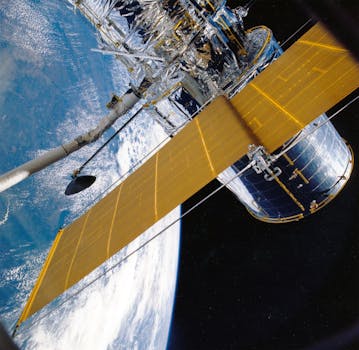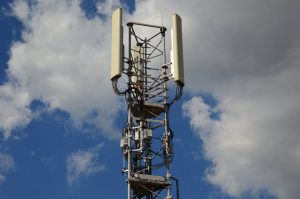The Future of Satellites: Revolutionizing Global Connectivity and Exploration

The future of satellites is a topic of great interest and excitement, as these orbiting devices continue to play a vital role in shaping our world. Future of satellites is an area that has seen tremendous growth and innovation in recent years, and it is expected to revolutionize the way we communicate, navigate, and explore space. From providing internet access to remote areas to enabling precise weather forecasting, satellites have become an essential part of modern life.
One of the most significant trends in the future of satellites is the development of smaller, more efficient, and cost-effective satellites. Traditionally, satellites have been large, complex, and expensive to build and launch. However, with the advent of new technologies and manufacturing techniques, it is now possible to produce smaller satellites that can perform a wide range of tasks at a lower cost. This has opened up new opportunities for companies and organizations to launch their own satellites and explore the benefits of space-based technologies.
Another area that is expected to shape the future of satellites is the growth of satellite constellations. A satellite constellation is a network of satellites that work together to provide global coverage and connectivity. These constellations have the potential to revolutionize the way we communicate, enabling fast, reliable, and secure internet access anywhere in the world. Companies such as OneWeb, SpaceX, and Amazon are already working on launching their own satellite constellations, which are expected to transform the global telecommunications landscape.
In addition to their role in communication, satellites are also playing an increasingly important part in space exploration. With the help of satellites, scientists can study the Earth’s climate, monitor natural disasters, and gain insights into the universe. Satellites have also enabled the exploration of other planets and celestial bodies, such as Mars and the Moon. As space agencies and private companies continue to push the boundaries of space exploration, satellites will remain a crucial component of these efforts.
The future of satellites also holds great promise for various industries, including navigation, agriculture, and weather forecasting. Satellites can provide precise location data, enabling the development of advanced navigation systems. They can also be used to monitor crop health, predict weather patterns, and track climate changes. As the use of satellites becomes more widespread, we can expect to see significant improvements in these areas, leading to increased efficiency, productivity, and sustainability.
However, the future of satellites also poses some challenges and concerns. One of the main issues is the growing problem of space debris, which can pose a risk to operational satellites and other space-based assets. There is also the issue of satellite regulation, as governments and international organizations work to establish clear guidelines and standards for the use of satellites. Additionally, the increasing reliance on satellites raises concerns about cybersecurity and the potential for satellite hacking or disruption.
Despite these challenges, the future of satellites looks bright, with many exciting developments on the horizon. As technology continues to advance and new innovations emerge, we can expect to see significant improvements in satellite design, launch, and operation. The use of artificial intelligence, machine learning, and other advanced technologies will also play a key role in shaping the future of satellites, enabling them to become even more powerful, efficient, and accessible.
In conclusion, the future of satellites is a rapidly evolving field that holds immense promise for transforming global connectivity, space exploration, and various industries. As we continue to push the boundaries of what is possible with satellites, we can expect to see significant advancements in the years to come. Whether it is providing internet access to remote areas, enabling precise weather forecasting, or exploring the vastness of space, satellites will remain a vital component of our modern world.
The development of satellite technology is a complex and ongoing process, with many different factors at play. However, by understanding the trends, challenges, and opportunities that are shaping the future of satellites, we can gain a deeper appreciation for the importance of these orbiting devices and the role they will play in shaping our future.
As we look to the future, it is clear that satellites will continue to play a vital role in our lives, transforming the way we communicate, navigate, and explore space. With their ability to provide global coverage, enable precise data collection, and facilitate advanced research, satellites are an essential component of our modern world. As we continue to push the boundaries of what is possible with satellites, we can expect to see significant advancements in the years to come, leading to a brighter, more connected, and more sustainable future for all.
The impact of satellites on our daily lives is already significant, and it will only continue to grow as the technology advances. From the GPS systems that guide us to the weather forecasts that warn us of impending storms, satellites are an integral part of our daily routines. As we look to the future, it is clear that satellites will play an even more important role in shaping our world, enabling us to communicate, navigate, and explore with greater ease and precision.
In the coming years, we can expect to see significant advancements in satellite technology, from the development of smaller, more efficient satellites to the growth of satellite constellations. These advancements will enable the widespread adoption of satellite-based technologies, leading to improvements in global connectivity, space exploration, and various industries. As the use of satellites becomes more widespread, we can expect to see significant improvements in our daily lives, from faster and more reliable internet access to more accurate weather forecasts and more efficient navigation systems.
Furthermore, the future of satellites holds great promise for the development of new industries and applications. From the use of satellites in agriculture to the development of satellite-based navigation systems, the possibilities are endless. As the technology continues to advance, we can expect to see the emergence of new and innovative applications, leading to significant economic and social benefits.
In addition to the economic and social benefits, the future of satellites also holds great promise for the environment. By enabling the collection of precise data on climate changes, weather patterns, and natural disasters, satellites can play a crucial role in helping us to better understand and mitigate the impact of human activity on the environment. As we continue to push the boundaries of what is possible with satellites, we can expect to see significant advancements in our ability to monitor and protect the environment.
Finally, the future of satellites is a complex and multifaceted field, with many different factors at play. However, by understanding the trends, challenges, and opportunities that are shaping the future of satellites, we can gain a deeper appreciation for the importance of these orbiting devices and the role they will play in shaping our future. Whether it is providing internet access to remote areas, enabling precise weather forecasting, or exploring the vastness of space, satellites will remain a vital component of our modern world, transforming the way we communicate, navigate, and explore.
The future of satellites is a rapidly evolving field, with many exciting developments on the horizon. As technology continues to advance and new innovations emerge, we can expect to see significant improvements in satellite design, launch, and operation. The use of artificial intelligence, machine learning, and other advanced technologies will also play a key role in shaping the future of satellites, enabling them to become even more powerful, efficient, and accessible.
In conclusion, the future of satellites holds immense promise for transforming global connectivity, space exploration, and various industries. As we continue to push the boundaries of what is possible with satellites, we can expect to see significant advancements in the years to come, leading to a brighter, more connected, and more sustainable future for all. With their ability to provide global coverage, enable precise data collection, and facilitate advanced research, satellites are an essential component of our modern world, and their importance will only continue to grow as the technology advances.
As we look to the future, it is clear that satellites will play a vital role in shaping our world, enabling us to communicate, navigate, and explore with greater ease and precision. Whether it is providing internet access to remote areas, enabling precise weather forecasting, or exploring the vastness of space, satellites will remain a crucial component of our modern world, transforming the way we live, work, and interact with one another.
The development of satellite technology is a complex and ongoing process, with many different factors at play. However, by understanding the trends, challenges, and opportunities that are shaping the future of satellites, we can gain a deeper appreciation for the importance of these orbiting devices and the role they will play in shaping our future. As we continue to push the boundaries of what is possible with satellites, we can expect to see significant advancements in the years to come, leading to a brighter, more connected, and more sustainable future for all.
The future of satellites is a topic of great interest and excitement, as these orbiting devices continue to play a vital role in shaping our world. With advancements in technology, satellites are becoming increasingly powerful, efficient, and accessible, enabling the widespread adoption of satellite-based technologies and leading to significant improvements in global connectivity, space exploration, and various industries.
In the coming years, we can expect to see significant advancements in satellite technology, from the development of smaller, more efficient satellites to the growth of satellite constellations. These advancements will enable the widespread adoption of satellite-based technologies, leading to improvements in global connectivity, space exploration, and various industries. As the use of satellites becomes more widespread, we can expect to see significant improvements in our daily lives, from faster and more reliable internet access to more accurate weather forecasts and more efficient navigation systems.
Furthermore, the future of satellites holds great promise for the development of new industries and applications. From the use of satellites in agriculture to the development of satellite-based navigation systems, the possibilities are endless. As the technology continues to advance, we can expect to see the emergence of new and innovative applications, leading to significant economic and social benefits.
In addition to the economic and social benefits, the future of satellites also holds great promise for the environment. By enabling the collection of precise data on climate changes, weather patterns, and natural disasters, satellites can play a crucial role in helping us to better understand and mitigate the impact of human activity on the environment. As we continue to push the boundaries of what is possible with satellites, we can expect to see significant advancements in our ability to monitor and protect the environment.
Finally, the future of satellites is a complex and multifaceted field, with many different factors at play. However, by understanding the trends, challenges, and opportunities that are shaping the future of satellites, we can gain a deeper appreciation for the importance of these orbiting devices and the role they will play in shaping our future. Whether it is providing internet access to remote areas, enabling precise weather forecasting, or exploring the vastness of space, satellites will remain a vital component of our modern world, transforming the way we communicate, navigate, and explore.
The Benefits of Satellites
Satellites have many benefits, including providing global coverage, enabling precise data collection, and facilitating advanced research. They also play a crucial role in helping us to better understand and mitigate the impact of human activity on the environment. With the ability to collect precise data on climate changes, weather patterns, and natural disasters, satellites can help us to predict and prepare for extreme weather events, reducing the risk of damage to property and loss of life.
In addition to their role in environmental monitoring, satellites also have many other benefits. They can provide internet access to remote areas, enabling communities to connect with the rest of the world and access vital information and services. They can also enable precise navigation, facilitating the development of advanced transportation systems and improving the safety and efficiency of travel.
Satellites can also play a crucial role in the development of new industries and applications. From the use of satellites in agriculture to the development of satellite-based navigation systems, the possibilities are endless. As the technology continues to advance, we can expect to see the emergence of new and innovative applications, leading to significant economic and social benefits.
The benefits of satellites are not limited to their practical applications. They also have the potential to inspire and educate, facilitating a greater understanding and appreciation of the world around us. By providing stunning images of the Earth and other celestial bodies, satellites can help to spark our imagination and curiosity, inspiring us to learn more about the universe and our place within it.
The Challenges of Satellites
Despite the many benefits of satellites, there are also several challenges associated with their use. One of the main challenges is the growing problem of space debris, which can pose a risk to operational satellites and other space-based assets. There is also the issue of satellite regulation, as governments and international organizations work to establish clear guidelines and standards for the use of satellites.
In addition to these challenges, the use of satellites also raises concerns about cybersecurity and the potential for satellite hacking or disruption. As the reliance on satellites continues to grow, it is essential that we take steps to protect them from cyber threats and ensure the integrity of the data they provide.
Another challenge associated with the use of satellites is the issue of accessibility. While satellites have the potential to provide internet access to remote areas, they can also be expensive and difficult to launch and maintain. This can make it challenging for communities in developing countries or remote areas to access the benefits of satellite technology.
Finally, the use of satellites also raises concerns about the environment. The launch and operation of satellites can have a significant impact on the environment, from the pollution caused by rocket launches to the risk of space debris. As the use of satellites continues to grow, it is essential that we take steps to mitigate their impact on the environment and ensure that they are used in a sustainable and responsible manner.
The Future of Satellite Technology
The future of satellite technology is a rapidly evolving field, with many exciting developments on the horizon. As technology continues to advance and new innovations emerge, we can expect to see significant improvements in satellite design, launch, and operation. The use of artificial intelligence, machine learning, and other advanced technologies will also play a key role in shaping the future of satellites, enabling them to become even more powerful, efficient, and accessible.
One of the most significant trends in the future of satellite technology is the development of smaller, more efficient satellites. Traditionally, satellites have been large, complex, and expensive to build and launch. However, with the advent of new technologies and manufacturing techniques, it is now possible to produce smaller satellites that can perform a wide range of tasks at a lower cost.
Another trend that is expected to shape the future of satellite technology is the growth of satellite constellations. A satellite constellation is a network of satellites that work together to provide global coverage and connectivity. These constellations have the potential to revolutionize the way we communicate, enabling fast, reliable, and secure internet access anywhere in the world.
The future of satellite technology also holds great promise for the development of new industries and applications. From the use of satellites in agriculture to the development of satellite-based navigation systems, the possibilities are endless. As the technology continues to advance, we can expect to see the emergence of new and innovative applications, leading to significant economic and social benefits.
In addition to the economic and social benefits, the future of satellite technology also holds great promise for the environment. By enabling the collection of precise data on climate changes, weather patterns, and natural disasters, satellites can play a crucial role in helping us to better understand and mitigate the impact of human activity on the environment. As we continue to push the boundaries of what is possible with satellites, we can expect to see significant advancements in our ability to monitor and protect the environment.
Finally, the future of satellite technology is a complex and multifaceted field, with many different factors at play. However, by understanding the trends, challenges, and opportunities that are shaping the future of satellites, we can gain a deeper appreciation for the importance of these orbiting devices and the role they will play in shaping our future. Whether it is providing internet access to remote areas, enabling precise weather forecasting, or exploring the vastness of space, satellites will remain a vital component of our modern world, transforming the way we communicate, navigate, and explore.
The development of satellite technology is a complex and ongoing process, with many different factors at play. However, by understanding the trends, challenges, and opportunities that are shaping the future of satellites, we can gain a deeper appreciation for the importance of these orbiting devices and the role they will play in shaping our future. As we continue to push the boundaries of what is possible with satellites, we can expect to see significant advancements in the years to come, leading to a brighter, more connected, and more sustainable future for all.
In conclusion, the future of satellites holds immense promise for transforming global connectivity, space exploration, and various industries. As we continue to push the boundaries of what is possible with satellites, we can expect to see significant advancements in the years to come, leading to a brighter, more connected, and more sustainable future for all. With their ability to provide global coverage, enable precise data collection, and facilitate advanced research, satellites are an essential component of our modern world, and their importance will only continue to grow as the technology advances.






